For long-lasting homemade perfumes, you'll find three powerful natural fixatives that stand above the rest. Benzoin extract offers a sweet, vanilla-like base that anchors fragrances with just a 3-5% concentration. Vanilla, whether as infused beans or extract, creates an inviting foundation while extending scent longevity. Sandalwood essential oil (27-32 drops) binds fragrance molecules effectively when combined with vanilla. Each fixative holds unique properties that can transform your DIY perfume journey.
The Power of Benzoin: A Sweet and Long-Lasting Natural Fixative
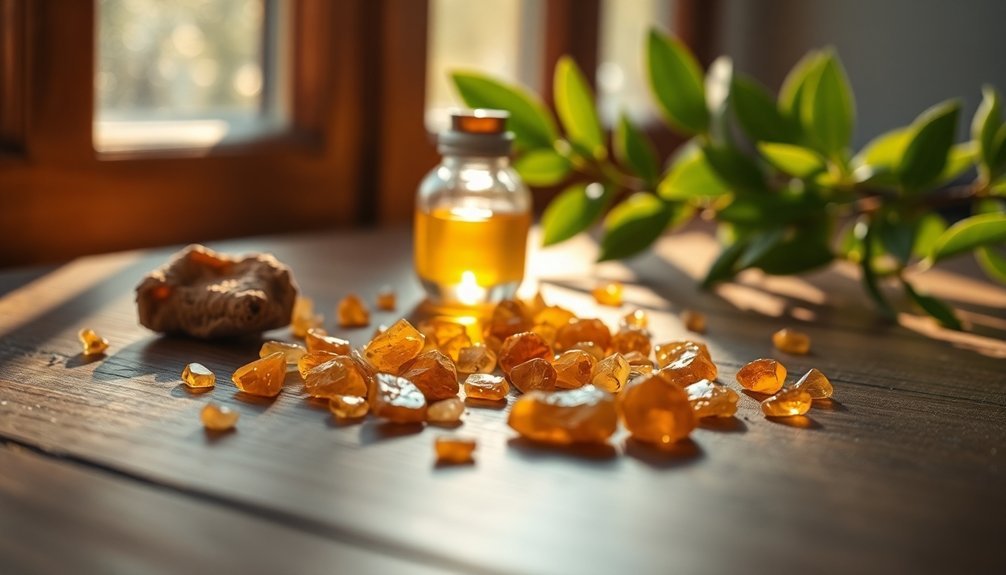
If you're seeking a natural fixative for your homemade perfumes, benzoin stands as one of nature's most effective options. This amber-colored substance, extracted from the Styrax benzoin tree, offers a sweet, vanilla-like aroma with subtle spicy undertones that'll enhance your perfume creations.
You'll find benzoin particularly useful as a base note, where it excels at anchoring other fragrances and extending their longevity. It's especially compatible with oriental, amber, and gourmand scents, adding warmth and depth to your blends. Since it's diluted with ethanol, benzoin works perfectly in alcohol-based perfumes but should be avoided in oil-based formulations.
When working with benzoin, aim for a 3-5% concentration in your perfume formulations.
Remember to handle benzoin with care, as it can be thick and challenging to work with. While it's an excellent fixative, be mindful that it may cause skin sensitization in some individuals.
Vanilla and Sandalwood: Double-Duty Fixatives for Homemade Perfumes
The dynamic duo of vanilla and sandalwood offers perfume makers a powerful combination of natural fixatives.
You'll find vanilla particularly effective in base notes, where it enhances fragrance longevity while adding its lush, noble aroma. You can use vanilla beans infused in carrier oil or vanilla extract, though beans provide more complexity to your blend. A captivating vanilla aroma creates an inviting foundation for any perfume blend.
Sandalwood's musky, smooth scent works perfectly alongside vanilla, helping to bind fragrance molecules and prevent quick evaporation.
You can incorporate 27-32 drops of sandalwood essential oil in your recipes, whether you're creating liquid or solid perfumes. For best results, combine vanilla-infused oil with alcohol or witch hazel, then blend in your sandalwood essential oil.
This combination creates a stable, long-lasting foundation that's perfect for your homemade perfumes.
Frankincense Resin: Ancient Wisdom for Modern DIY Fragrances
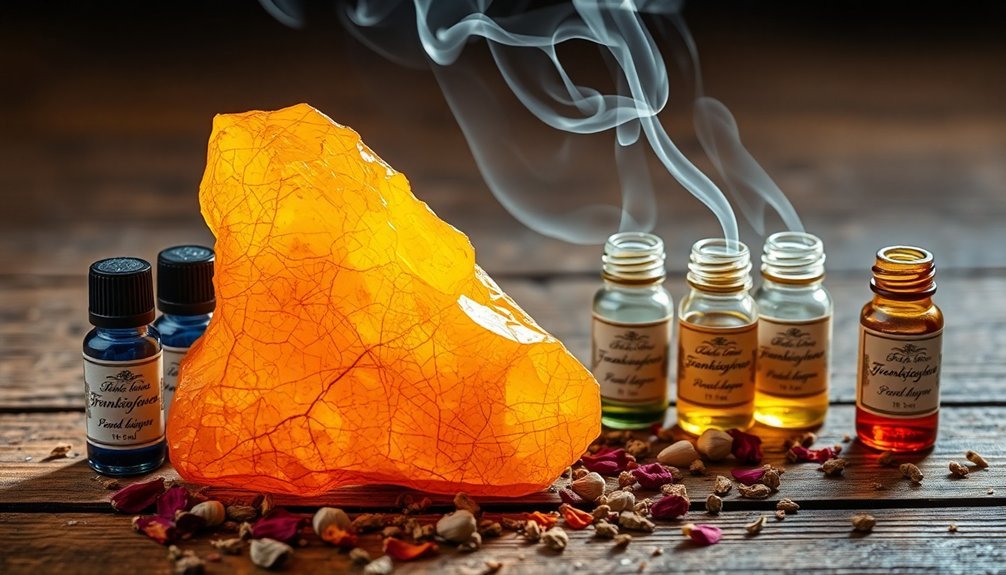
Since ancient times, frankincense resin has served as one of perfumery's most treasured fixatives, derived from sacred Boswellia trees native to Africa and India.
When you're crafting homemade perfumes, you'll find this golden resin invaluable for extending your fragrance's longevity and adding sophisticated depth.
Many modern perfume manufacturers are now turning to frankincense as synthetic alternatives become increasingly prevalent in the industry.
To use frankincense effectively, select high-quality, opaque tears and blend them with complementary essential oils like bergamot, patchouli, or rose.
You'll notice its rich, resinous scent with hints of citrus and balsamic notes helps bridge your perfume's top and base notes while stabilizing the overall composition.
Don't hesitate to pair frankincense with other natural fixatives like benzoin or myrrh.
Remember to test your blends on scent strips and allow your perfume to age, letting the notes mature harmoniously.
Frequently Asked Questions
Can Natural Fixatives Cause Allergic Reactions When Used in Homemade Perfumes?
Yes, you can experience allergic reactions to natural fixatives, including skin rashes, breathing issues, and eye irritation. It's essential that you perform patch testing before using them to avoid potential sensitivities.
How Long Can Homemade Perfumes With Natural Fixatives Be Stored?
You can store your homemade perfumes with natural fixatives for 6-12 months when kept in dark bottles and cool places. They'll last longer if you've properly aged the concentrate and sealed them tightly.
What Percentage of Fixatives Should Be Used in Water-Based Perfume Recipes?
You'll need to experiment with fixative percentages in water-based perfumes, as there's no fixed ratio. Generally, start with 3-5% natural fixatives, but adjust based on your solvent system and desired fragrance longevity.
Can Natural Fixatives Be Mixed Together for Stronger Effects?
Yes, you can mix natural fixatives together for enhanced effects. You'll get better longevity and depth by combining compatible fixatives like benzoin with vanilla or frankincense with myrrh in appropriate ratios.
Which Natural Fixatives Work Best in Solid Perfume Formulations?
You'll find that sandalwood and myrrh work exceptionally well in solid perfumes, as they blend smoothly with waxes and oils. Cedarwood and vanilla are also great choices for their strong anchoring properties.
In Summary
You'll be amazed at how these three natural fixatives can transform your homemade perfumes into long-lasting fragrances. Whether you choose benzoin's sweet warmth, vanilla and sandalwood's dual benefits, or frankincense's time-tested power, you're now equipped to create perfumes that stay with you throughout the day. Don't hesitate to experiment with different combinations of these fixatives to find your perfect signature scent.
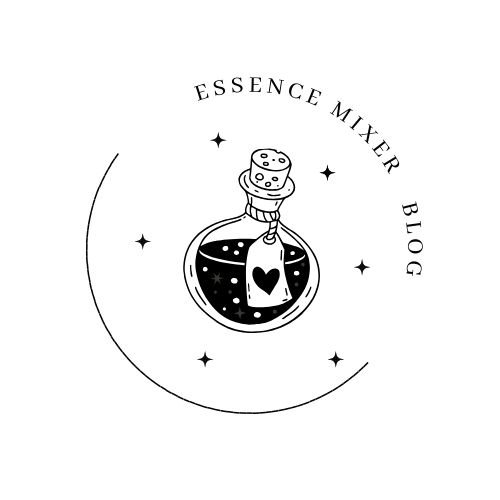
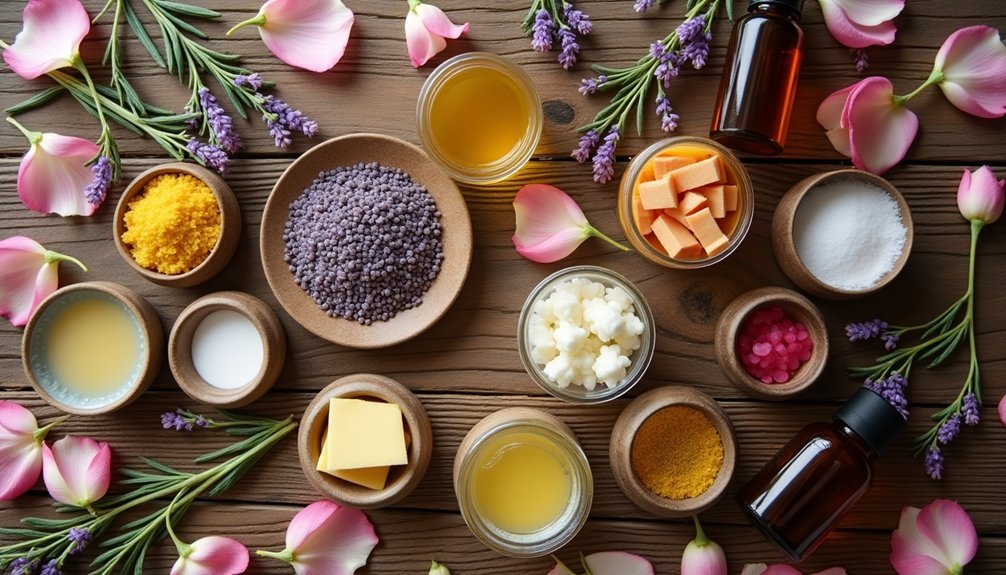


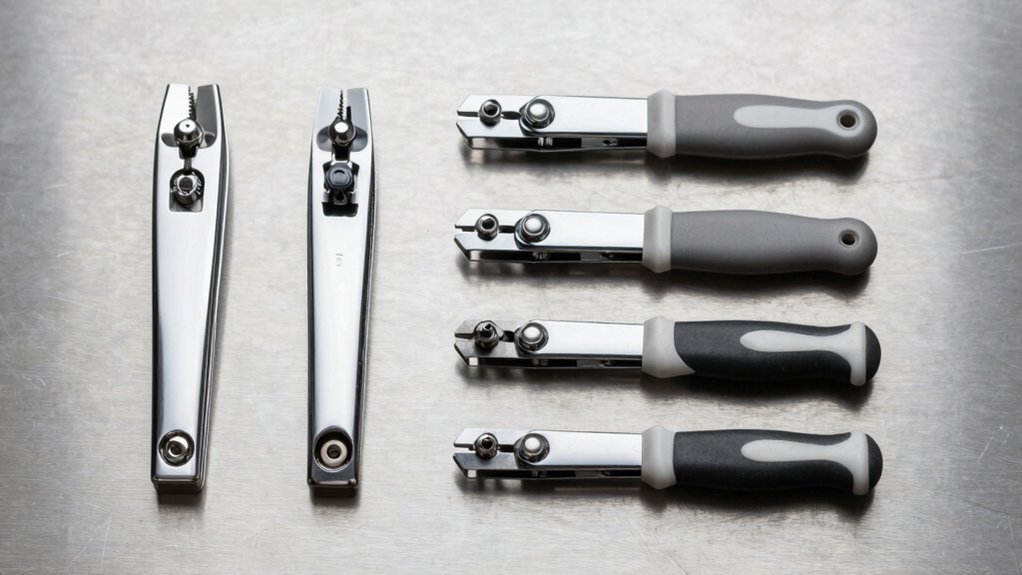
Leave a Reply